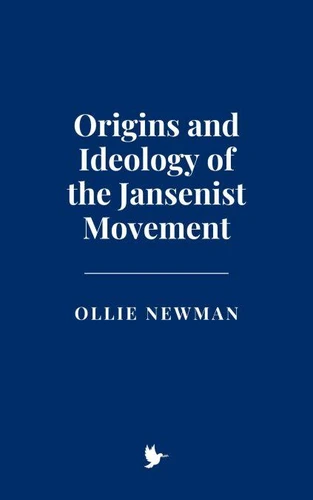Origins and Ideology of the Jansenist Movement
Par :Formats :
Disponible dans votre compte client Decitre ou Furet du Nord dès validation de votre commande. Le format ePub est :
- Compatible avec une lecture sur My Vivlio (smartphone, tablette, ordinateur)
- Compatible avec une lecture sur liseuses Vivlio
- Pour les liseuses autres que Vivlio, vous devez utiliser le logiciel Adobe Digital Edition. Non compatible avec la lecture sur les liseuses Kindle, Remarkable et Sony
 , qui est-ce ?
, qui est-ce ?Notre partenaire de plateforme de lecture numérique où vous retrouverez l'ensemble de vos ebooks gratuitement
Pour en savoir plus sur nos ebooks, consultez notre aide en ligne ici
- FormatePub
- ISBN8227708014
- EAN9798227708014
- Date de parution08/03/2025
- Protection num.pas de protection
- Infos supplémentairesepub
- ÉditeurBig Dog Books, LLC
Résumé
This book is an in-depth exploration of the theological, intellectual, and political impact of Jansenism from its origins in the early 17th century to its long-lasting influence on Catholic and secular thought. Rooted in the teachings of St. Augustine, Jansenism emphasized the absolute sovereignty of divine grace, the rejection of human cooperation in salvation, and a critique of both papal authority and the moral laxity it saw within the Catholic Church.
This book examines the life of Cornelius Jansen, the movement's foundational text Augustinus, and the intellectual contributions of key figures such as Blaise Pascal, Antoine Arnauld, and Jean du Vergier de Hauranne (Abbé de Saint-Cyran). It traces the development of Jansenism through theological debates with the Jesuits, its political tensions with the French monarchy, and its suppression by both the papacy and the crown.
Through detailed analysis, this book explores the religious and philosophical implications of Jansenist ideas, focusing on their critique of free will, their moral rigor, and their insistence on the necessity of divine grace. The Jansenist influence is tracked through the Enlightenment, the French Revolution, and into modern philosophical and theological debates, where the movement's intellectual legacy continues to reverberate.
By examining the rise and eventual suppression of Jansenism, this work highlights how the movement contributed to key religious, intellectual, and political shifts in early modern Europe. Ultimately, it provides a comprehensive understanding of Jansenism's lasting impact on the Catholic Church, secular philosophy, and the evolution of religious thought.
This book examines the life of Cornelius Jansen, the movement's foundational text Augustinus, and the intellectual contributions of key figures such as Blaise Pascal, Antoine Arnauld, and Jean du Vergier de Hauranne (Abbé de Saint-Cyran). It traces the development of Jansenism through theological debates with the Jesuits, its political tensions with the French monarchy, and its suppression by both the papacy and the crown.
Through detailed analysis, this book explores the religious and philosophical implications of Jansenist ideas, focusing on their critique of free will, their moral rigor, and their insistence on the necessity of divine grace. The Jansenist influence is tracked through the Enlightenment, the French Revolution, and into modern philosophical and theological debates, where the movement's intellectual legacy continues to reverberate.
By examining the rise and eventual suppression of Jansenism, this work highlights how the movement contributed to key religious, intellectual, and political shifts in early modern Europe. Ultimately, it provides a comprehensive understanding of Jansenism's lasting impact on the Catholic Church, secular philosophy, and the evolution of religious thought.
This book is an in-depth exploration of the theological, intellectual, and political impact of Jansenism from its origins in the early 17th century to its long-lasting influence on Catholic and secular thought. Rooted in the teachings of St. Augustine, Jansenism emphasized the absolute sovereignty of divine grace, the rejection of human cooperation in salvation, and a critique of both papal authority and the moral laxity it saw within the Catholic Church.
This book examines the life of Cornelius Jansen, the movement's foundational text Augustinus, and the intellectual contributions of key figures such as Blaise Pascal, Antoine Arnauld, and Jean du Vergier de Hauranne (Abbé de Saint-Cyran). It traces the development of Jansenism through theological debates with the Jesuits, its political tensions with the French monarchy, and its suppression by both the papacy and the crown.
Through detailed analysis, this book explores the religious and philosophical implications of Jansenist ideas, focusing on their critique of free will, their moral rigor, and their insistence on the necessity of divine grace. The Jansenist influence is tracked through the Enlightenment, the French Revolution, and into modern philosophical and theological debates, where the movement's intellectual legacy continues to reverberate.
By examining the rise and eventual suppression of Jansenism, this work highlights how the movement contributed to key religious, intellectual, and political shifts in early modern Europe. Ultimately, it provides a comprehensive understanding of Jansenism's lasting impact on the Catholic Church, secular philosophy, and the evolution of religious thought.
This book examines the life of Cornelius Jansen, the movement's foundational text Augustinus, and the intellectual contributions of key figures such as Blaise Pascal, Antoine Arnauld, and Jean du Vergier de Hauranne (Abbé de Saint-Cyran). It traces the development of Jansenism through theological debates with the Jesuits, its political tensions with the French monarchy, and its suppression by both the papacy and the crown.
Through detailed analysis, this book explores the religious and philosophical implications of Jansenist ideas, focusing on their critique of free will, their moral rigor, and their insistence on the necessity of divine grace. The Jansenist influence is tracked through the Enlightenment, the French Revolution, and into modern philosophical and theological debates, where the movement's intellectual legacy continues to reverberate.
By examining the rise and eventual suppression of Jansenism, this work highlights how the movement contributed to key religious, intellectual, and political shifts in early modern Europe. Ultimately, it provides a comprehensive understanding of Jansenism's lasting impact on the Catholic Church, secular philosophy, and the evolution of religious thought.























